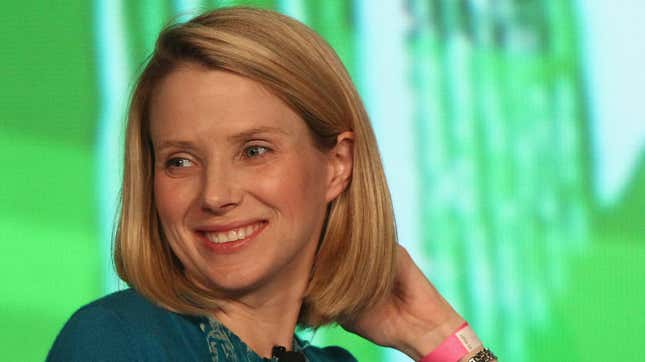
Congratulations, Marissa Mayer, on the birth of your baby boy and welcome to the world of motherhood—and eternal judgment.
Much of the news surrounding the impending arrival of your child focused on your plan to take just “a few weeks” of working maternity leave. It was all the buzz among my female friends and listservs, mommy and non-mommy alike. Consider one reaction from the moms we love to hate (but read religiously) over at UrbanBaby:
“I just don’t know the point of having a baby if you have no time to care for it, not even when it is a newborn.”
I’m no CEO but I have been on two maternity leaves and here’s a confession that might make you feel better: I worked through both of them, too. It’s what successful women do.
In my case, I took six-month leaves after both my children were born; the first was paid through month four, the second was largely unpaid. But I still had to work, partly for the money, mostly for my mind.
Motherhood rarely goes as planned. My elder daughter arrived three weeks early—and I happened to be in the middle of writing a story. So I sent the editor an email from the labor room of the Washington, D.C., hospital, had the baby, came home two days later and, while my mom held her, I finished writing the piece.
For the remainder of that leave, I also worked on a book proposal and gave several speeches to earn money and maintain some relevance. When I could, I brought my mom and baby along and learned how to pump and scribble my remarks beforehand in a bathroom stall.
By the time I got pregnant with my second child, we were living in New York City and had a much smaller house, much higher mortgage. So I found a gig teaching, thinking two days a week in the classroom would be better than going back to regular work too early. This time, I prepared for an early arrival, expecting the baby would be three months by my first class.
Of course, she was late. So I delivered my first class lecture feeling guilty for leaving an eight-week-old away for a whole day. But I had enough to pay the mortgage—and the sitter. Importantly, I also had that satisfaction that comes from a woman being her own person, before and after the birth of her children.
Before the mommy blogs begin slamming me, too, let’s get the street cred out of the way: I exclusively breastfed the first and am still doing so with the second. I am my elder daughter’s class parent and try to make most PTA meetings. Attending music class with the younger one isn’t always convenient (or enjoyable, to be frank, since we sing the same songs over and over and over) but I try to relieve the nanny on occasion. The professionalization of parenthood has created a bizarre formula for women like me: the busier we are at work, the more involved we get in our kids’ lives.
But for all the truce-calling in the Mommy Wars and the inherent classism within, the reaction to your plans to return to work have especially felt unjust. In the US, as a society, we have accepted the poor’s inability to stay home for long after their children are born; hourly wage work without paid leave or job security basically mandate a speedy return. And yet, the Mom Judges say, a mom as wealthy as you should be able to afford more time with her child, right? At least to serve as an example to the rest of middle-class motherhood?
This point of view fails to take into consideration your desires. Yahoo is at a critical juncture in its history, a battle in fact to ensure it does not become history. Perhaps your decision to take a few weeks of leave was driven by actually wanting to turn the company around, and knowing you are needed. Of course, there will be physical limitations in these early weeks, but spawning a new life is also exciting, inspiring, intoxicating. Each birth of a child, I tell my friends, made me wiser, more efficient, more idealistic, more committed to leaving the world better than the one I inherited. And so I hope it goes for you, and, for Yahoo.
The reality is that mothering and working are complicated ventures, and can be harder for women to separate than their male counterparts. Many women, like me and perhaps ultimately you, blur them to create our balance, our success—and ultimately, that of our employers and our children.